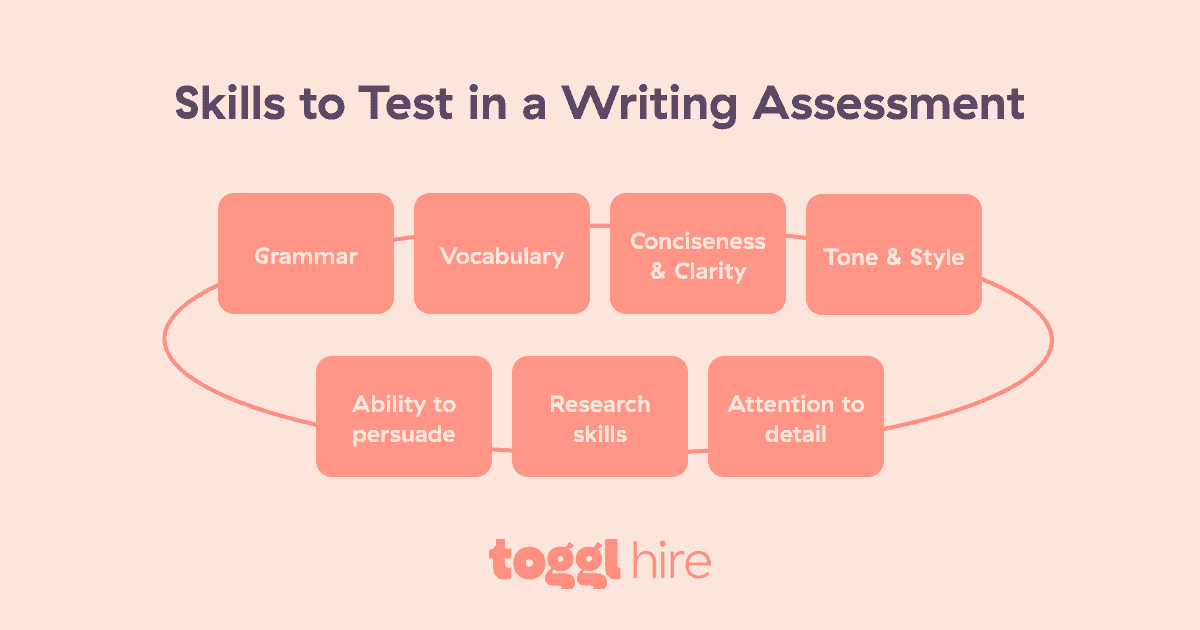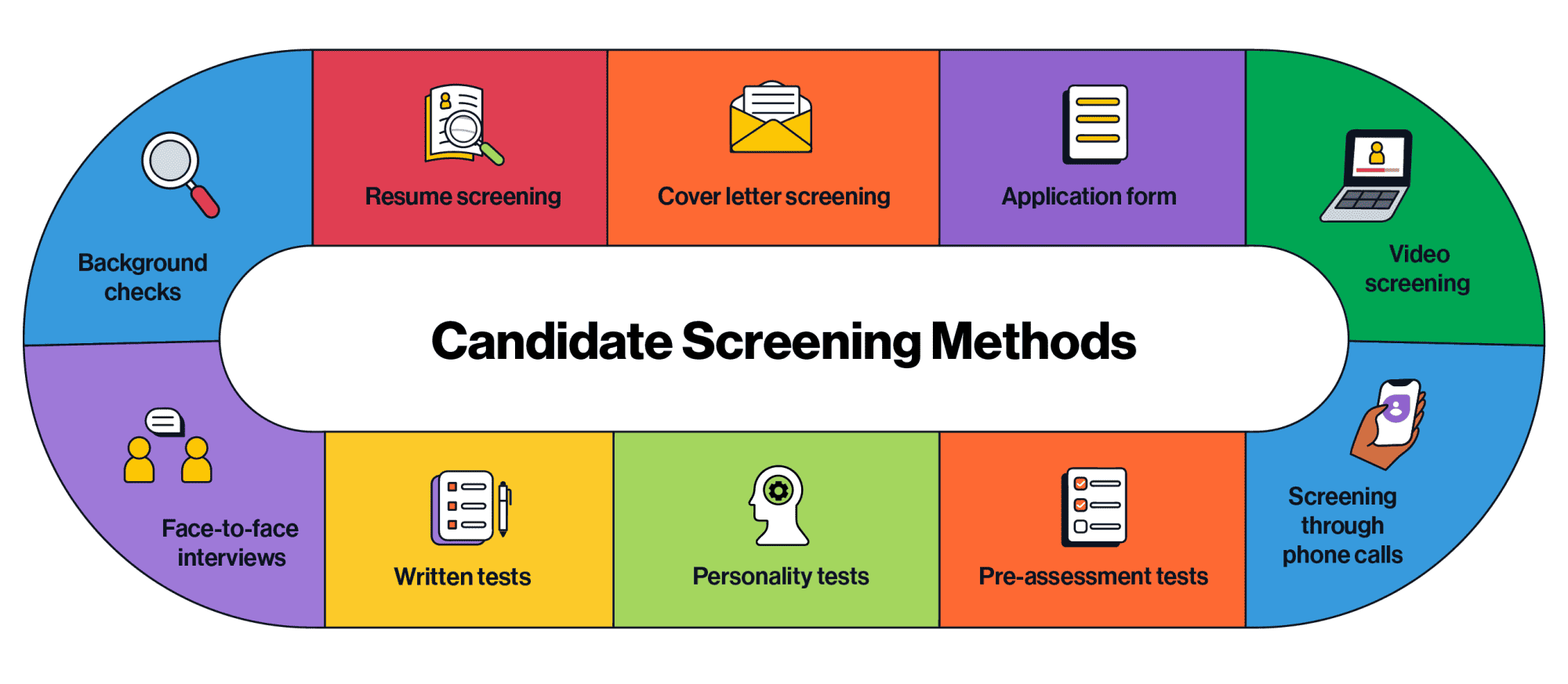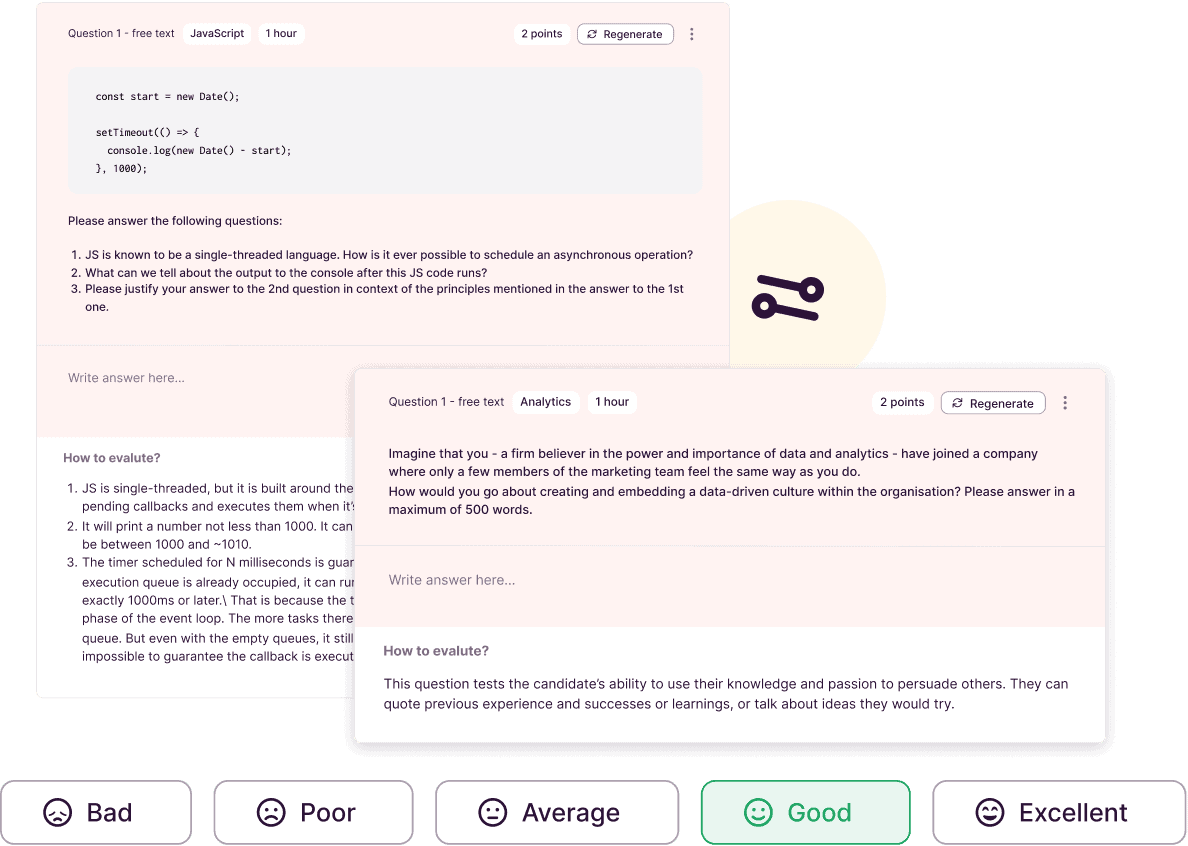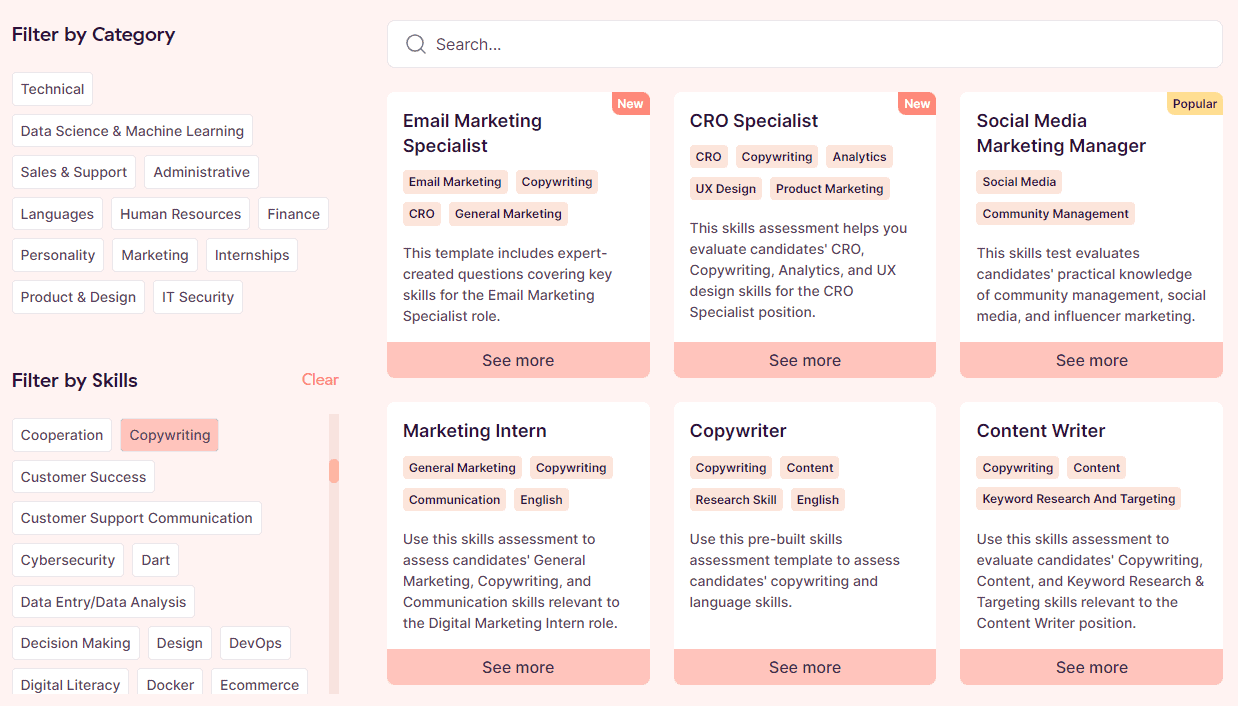A writing skills assessment test comes in handy when hiring for various roles – from the more obvious ones like content writers or marketers to more nuanced business roles like product managers.
Poor business writing can cost an organization an unhappy customer, at best, and missed business goals or a lawsuit at worst.
Testing candidates’ writing skills can ensure they have the proficiency to write, work smoothly with other colleagues and have a positive impact on customers, partners and other external stakeholders.
We’ll share a few pointers to help you design a writing skills assessment that surfaces applicants with great written communication skills. Here we go.
TL;DR – Key Takeaways
- A writing skills test is an assessment of candidates’ writing skills. It evaluates their core writing skills like grammar and syntax as well as their overall writing process for conciseness and a logical flow of information.
- A writing skills assessment can determine a job seeker’s writing proficiency, and filter out candidates that may ultimately cost the company a lot of time and money with poor-quality writing and communication errors among colleagues or even customers.
- To assess writing skills effectively, hiring teams should focus their testing on core capabilities like grammar, vocabulary, and clarity shown in their writing tasks.
- To design a good writing skills assessment, focus on making the test relevant for the role and ensure it evaluates all the writing skills the role requires.
- Follow best practices when administering a writing skills test, such as clearly defining the test objectives and evaluating the results fairly.
- Avoid common pitfalls like bias towards a particular writing style or disregarding cultural differences.
- Quickly build a custom writing skills assessment or use one of our ready-made templates to evaluate job-relevant writing skills and hire top-quality candidates.

What is a writing skills assessment test?
A writing skills test provides a way to measure candidates’ written communication skills and their overall writing process. A typical writing skills assessment will test a person’s grammar and sentence structure, spelling and punctuation, and the clarity of their business communication.
Depending on the role, the test taker may also need to demonstrate more advanced writing skills.
For example, an email marketer must be able to write in an engaging, persuasive way to get the reader to click on their email links – that’s conversion copywriting at play. A product manager must demonstrate a capacity to eloquently express their ideas, explain the business logic of a new feature and align cross-functional teams via written communication.
Today, not only copywriters and content team members need good writing skills. It’s also essential for all customer-facing roles like sales, customer service, and customer success. If employees lack basic writing skills they risk:
- Causing confusion in teams
- Slowing down or blocking workflows
- Upsetting colleagues
- Chasing away customers or partners

Why use writing skills assessment tests in hiring?
Hiring teams that select talent with good writing skills can save the business time and revenue, and boost productivity.
According to the 2023 State of Business Communication report by The Harris Poll and Grammarly, miscommunication costs US businesses approximately $1.2 trillion annually.
The report also highlights that employees typically spend half of their work week on written communication, such as writing emails, documenting processes, preparing presentations or communicating via a text-based chat. And that teams can lose up to one entire workday per week, resolving poor team communication issues!

Writing tests can help talent acquisition teams recruit quality candidates. But here’s an even better hack — job-specific writing skills assessments. The benefits of this form of written assessment recruiting tool include:
- Role-specific competency: Writing tests tailored to the specific tasks candidates will perform will test how they will actually manage in the role and can help the hiring team make more informed hiring decisions.
- Scenario-level proficiency: These tests allow you to gauge a candidate’s ability to write for specific audiences, scenarios, or industries and give managers a better idea of whether the candidate actually has the experience they list on the CV.
- Identifying training needs: Job-specific writing tasks can also help identify areas where successful candidates need training or development to streamline onboarding and upskilling efforts.
7 Core candidate writing skills to test
The fundamental skills a writing assessment should test for in a suitable candidate include:
- Grammar: Test takers are expected to understand the basics of a language, like how to structure sentences, so their written words don’t cause any confusion or misunderstandings.
- Vocabulary: Good vocabulary is a must-have skill in some roles, such as copywriting, or for those in exec or decision-making positions. Interestingly, knowing how to simplify language can be equally important to ensure your target audience gets your message clearly.
- Conciseness and clarity: Concise written communication is important in business to ensure your message makes sense and it doesn’t take others ages to decipher what you’re trying to say.
- Tone and style: Adapting the tone and style to a particular industry or brand style is an essential skill for a writer that enables them to speak from the ‘voice’ of the company and in a way that their industry expects.
- Persuasiveness: Persuasive writing skills are vital for people in marketing and sales roles. Today, most roles need to be able to communicate or provide an explanation in a persuasive way, such as a data scientist communicating insights to stakeholders.
- Research skills: Copywriters need independent research skills to create helpful, relevant content their audience can use to learn about new topics and support their buying decisions.
- Attention to detail: Attention to detail is an asset for internal and external communications. Receiving clear, professional communication is something that everyone appreciates.

Types of assessment tests to evaluate a candidate’s writing skills
Wondering what type of job-specific writing assessment test to choose? Well, many testing platforms offer customizable test types, such as:
- Multiple choice questions
- Essay-based
- Task-based
- Portfolio assessments
- Homework assignments
Choosing the right one will depend on the job requirements.
For example, a task-based test, such as asking a shortlisted candidate to suggest new ad copy, is a great writing test for a copywriter.
If you’re hiring for a team lead or a more senior position in people operations, for example, a homework assignment based on communicating new benefits policy to employees will be key to assessing their writing skills in the HR context.
If you’re hiring a graphic designer, a portfolio assessment or review will be key to assessing their design skills. Or, for a marketing executive, a multiple-choice test on core marketing principles will work well.
The anatomy of an effective job-specific writing test
To test applicants’ writing skills effectively, use a job-specific writing test. This type of test should incorporate different components that test all the facets of a candidate’s writing skills. Your test should take into consideration best practices, such as:
Being relevant to the role
The tasks and questions that you include should simulate the real-world tasks that the successful candidate will actually perform on the job. For instance, for a freelance content writer for an HR SaaS tool, you could ask them to write a short article that explains a complex HR concept to a non-technical audience.
Comprehensive testing
Make sure the writing skills test covers the full range of writing skills, including grammar, punctuation, style, tone, vocabulary, and structure. Plus, it should also assess the candidate’s ability to understand and explain complex concepts simply and concisely.
Scenario-based tasks
This is a goodie!
Incorporate tasks that are based on real-life scenarios. For example, writing emails is a core skill for sales managers and customer success professionals, so why not simulate the experience of reaching out to a customer via email? Instead of trusting applicants’ self-assessment, see their core skills in action and decide for yourself!
Plus, in this instance, you get two-for-one — not only assessing their writing abilities but also evaluating their understanding of your product and target audience.
Reasonable requirements
If a candidate is applying for a new role, they are often still working full time and don’t have much spare time. So make sure your test is short, user-friendly, and accessible when it suits them to complete it.
Example of a scenario-based writing skills assessment (also known as a take-home task)
6 Top tips for incorporating writing skills assessment tests
A writing skills assessment is one component in the hiring process and forms part of the pre-employment assessments.
To ensure the candidate experience is a good one, the writing skills test should be an intuitive and easy step for applicants.

Here are a few things you can do to ensure the writing skills test is a positive candidate experience:
- Define the test objectives so you’re assessing the right capabilities for the role and the recruitment stage, and candidates are aware of what the parameters are.
- Make it easy for the test taker to access the test through an easily accessible link in an email or on the job ad.
- Provide adequate time for them to complete the test and respect their time with reasonable assessment expectations based on the test type (a basic skills test vs. paid homework assignment).
- Ensure the test setup doesn’t exclude any candidates like requiring candidates to be online throughout a lengthy paid test.
- Once you’ve got the results, ensure the team evaluates their answers fairly and objectively, avoiding any personal bias, for instance.
- Provide feedback to candidates whenever possible as this supports a better candidate experience.
Common pitfalls in results interpretation and how to avoid them
After applicants have completed their writing test, the hiring team will need to evaluate the results and select the most suitable candidate.

7 common mistakes to avoid
- Overemphasis on grammar: While correct spelling and being grammatically correct are important, they shouldn’t be the sole criteria for evaluating job seekers. It’s important to consider other aspects like creativity, clarity of ideas, and persuasiveness. Don’t let a few misspelled words hurt your chances of hiring a superstar (remember, there’s Grammarly!).
Tip: Create a balanced candidate scorecard rubric that includes all the factors you’re looking for, not grammar and punctuation alone. - Neglecting the task’s objective: Has the candidate achieved the primary objective of each task or deviated with their writing?
Tip: Clearly define the objectives of each test task and measure the applicant’s writing against that. - Bias towards particular writing styles: Evaluators might have a bias for certain writing styles, like a witty writing style, which could introduce personal bias.
Tip: Make a point of remaining objective. Decide whether the style is actually appropriate for the specific task and audience rather than simply aligning with your personal preferences. - Take into account cultural differences: When hiring globally, cultural and linguistic differences may affect a candidate’s writing style and word choice. For instance, the target language may not be their native or home language.
Tip: Ensure evaluators are trained to recognize and accommodate these differences, keeping the focus on effective communication. - Ignoring the importance of structure: The organization and flow of ideas within a piece of writing are crucial to effective communication.
Tip: Include ‘structure and organization’ as a distinct component in your evaluation criteria. - Over-reliance on automated tools: While automated tools can provide valuable initial assessments, they cannot fully assess elements like coherence, creativity, and communication effectiveness.
Tip: Use automated tools, such as a skills assessment platform, as a first step, but always follow up with a comprehensive human-to-human evaluation. - Inconsistent evaluation criteria: Changing evaluation criteria midway, or not having set evaluation criteria, can lead to the misinterpretation of results.
Tip: Develop a standard grading rubric before administering the test and ensure every evaluator understands how to use it and uses it consistently for each answer they’re assessing.
Example of a grading rubric for a writing test
| Performance Criteria | Exceeds Expectations | Meets Expectations | Below Expectations |
|---|---|---|---|
| Content | Accomplished purpose of assignment directly and completely in an exceptional manner. All major topics thoroughly supported by specific, accurate, relevant data. | Accomplished assignment in a capable manner. Major topics covered but supporting detail somewhat lacking in specificity, accuracy, or reference. | Accomplished purpose of assignment only partially or indirectly. Little or no supporting data presented was not relevant, specific or accurate. |
| Organization | Exceptionally clear sense of unity and order, logical transitions, highly effective opening and closing. | Adequate sense of unity and order, most transitions effective, clear opening and closing. | Lacked sense of unity and order, ineffective/lack of transitions, ineffective opening and closing. |
| Style (Clarity & Conciseness) | Used smooth, clear, readable prose in a superior way throughout, no clichés or wordiness, consistently effective word choice. | Used smooth, clear, readable prose throughout, few clichés, occasional wordiness, generally appropriate word choice. | Lacked smooth, clear, readable prose, contains clichés and wordiness, generally ineffective word choice. |
| Grammar & Mechanics | Few, if any, errors throughout in use of Standard English rules of grammar, spelling, punctuation, capitalization, and usage. | Not more than a few errors per page in use of Standard English rules of grammar, spelling, punctuation, capitalization, and usage, but did not affect overall clarity. | More than a few errors per page in use of Standard English rules of grammar, spelling, punctuation, capitalization, and usage that made the content unclear or difficult to read. |
See your candidates’ skills in action with Toggl Hire
The best way to ‘try before you buy’ in hiring is to test candidates’ skills.
With job-specific assessments, your team can better predict how they’ll perform and improve the chances of hooking quality talent that adds value to your organization and business immediately.
Get started quickly with our collection of over 200 test templates or string together custom tests quickly in our user-friendly test library. Your next written communication guru is a few clicks away.

Juste loves investigating through writing. A copywriter by trade, she spent the last ten years in startups, telling stories and building marketing teams. She works at Toggl Hire and writes about how businesses can recruit really great people.







